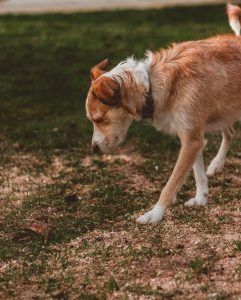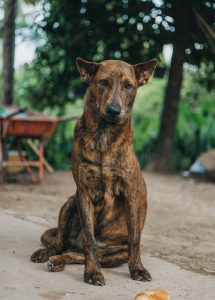
Posts by:
Dr. Justine A. Lee, DVM, DACVECC
Dog Checkups & Preventive Care
The holidays are stressful enough without you having to worry about rushing your dog or cat to the ER on Christmas Eve, right?
Before you put any presents below the Christmas tree, do your pet a favor – learn about the common holiday dangers that are poisonous to dogs and cats. Certain holiday dangers pose threats to pets, including certain foods, plants, home ornaments, and decorations.
I’d like to give a big shout-out to Pet Poison Helpline for sharing some top holiday danger threats that can poison dogs and cats during the holidays.
Foods
One of the most common emergencies I see are chewed-through packages of chocolate, chocolate-covered espresso beans, chocolate-covered macadamia nuts, chocolate-covered raisins, chocolate-covered … are you getting the hint? Remember, your dog has a great sense of smell. Mix that with some sharp teeth, and he can easily chew through your beautifully wrapped edible gifts. Not only is chocolate poisonous, but some of the other added ingredients may pose a double whammy. Espresso beans can contain a potentially fatal amount of caffeine, macadamia nuts can result in temporary paralysis, and raisins can result in acute kidney failure.
Some other common food dangers? Fattening, rich meat scraps (e.g., turkey, ham, etc.) can result in pancreatitis (i.e., inflammation of the pancreas), causing severe vomiting, diarrhea, malaise, and abdominal pain. Breeds such as Miniature
Schnauzers, Yorkshire Terriers, and Shetland Sheepdogs are especially predisposed, so fatty foods are an absolute no-no.
Sugarless gum, candy, and desserts may contain xylitol, a natural sweetener. When ingested by dogs, it results in a spike in insulin, causing a severe low blood sugar (e.g., hypoglycemia) and potential liver failure. Next, unbaked yeast bread dough and fruit cake (I mean, who really eats these anyway?) are potentially dangerous. Bloat, gastric-dilatation volvulus (GDV), and secondary alcohol poisoning can result from your dog ingesting unbaked bread dough. Your dog’s stomach acts as an artificial oven, and the warm, moist environment makes the yeast rise (causing bloat) and metabolizes the sugar into carbon dioxide and alcohol (causing alcohol poisoning). Another source of alcohol poisoning? Fruitcakes soaked in rum; when ingested by a dog or cat, alcohol can cause a dangerous drop in blood sugar, blood pressure and body temperature, potentially leading to seizures and respiratory failure. Also, the canned fruit (e.g., raisins) in fruit cake can result in acute kidney failure.
Yuletide plants
Don’t spread the hype: poinsettias are rarely poisonous. The sticky white sap in poinsettias usually only causes mild mouth or stomach irritation if ingested. Instead, the bigger threat are flower bouquets which contain lilies. As little as 1-2 leaves or petals – even the pollen – can result in severe, acute kidney failure in cats. Certain lilies including tiger, Asiatic, stargazer, day and Easter lilies pose the biggest threats. Thankfully, dogs are not affected, and only develop mild stomach upset with lily ingestion.
Like poinsettias, American mistletoe has been rumored to be poisonous too, but thankfully is only mildly toxic. It’s more dangerous cousin, the European mistletoe, can be quite toxic to pets. So, make sure you’re buying the right kind of mistletoe… or more importantly, hang it high out of reach so yours pets can’t chew on it.
Holiday decorations
If you have a cat, no tinsel for you! When ingested, tinsel, ribbon, string, or yarn can result in a severe linear foreign body, meaning the stringy tinsel can wrap around the base of the tongue or anchor itself in the stomach, making it impossible to pass through the intestines. As the intestines contract and move, tinsel can slowly saw through the tissue, resulting in severe damage to your pet’s intestinal tract. Treatment involves expensive abdominal surgery.
Another household holiday danger? Filling your house with the smell of evergreen and cinnamon can actually be poisonous to your cat. Some liquid potpourris contain chemicals called cationic detergents, and curious cats may take a lick or two from these simmering potpourri pots. When ingested by cats, liquid potpourri can result in severe chemical burns in the mouth, fever, difficulty breathing and tremors. Dogs are not as sensitive to the chemicals, but its best to keep potpourri out of their reach to avoid a burn also.
When in doubt, be aware of these very common holiday dangers to avoid in dogs and cats. The more you can pet-proof your house during the holidays, the less stressful it is for both the two-legged and four-legged family members. And more importantly, you can save that ER visit bill for gifts for your pets instead! Next week: some gift ideas for your dog and cat.
If you think your dog or cat ingested something poisonous, contact your veterinarian or an animal poison control center right away. When it comes to any poisoning situation, the sooner you diagnose it, the easier it is to potentially treat, the less invasive it is to your pet, and the less expensive it is for you.







